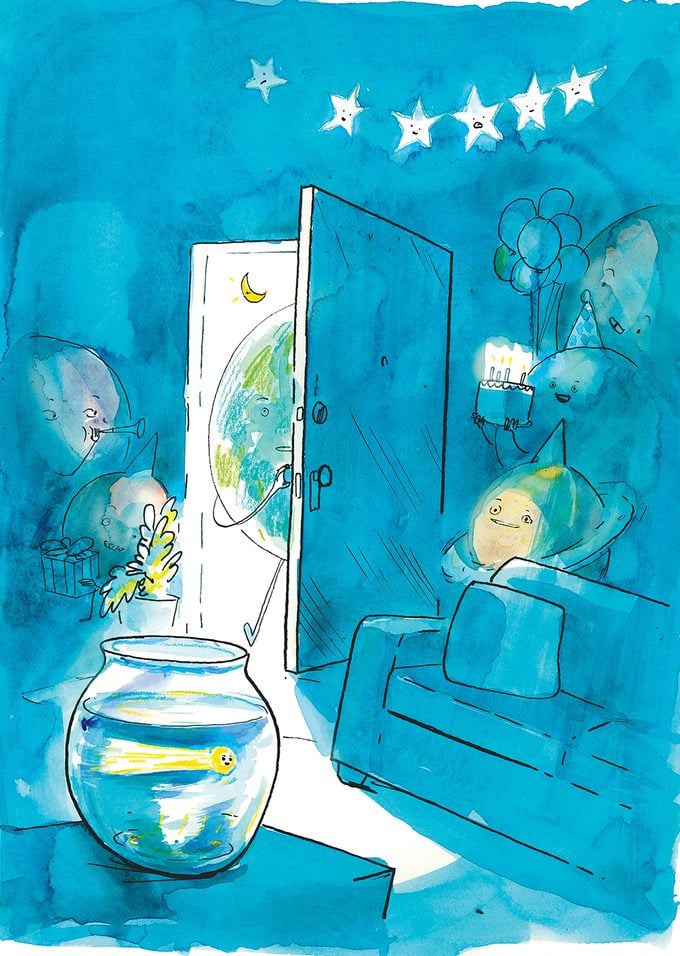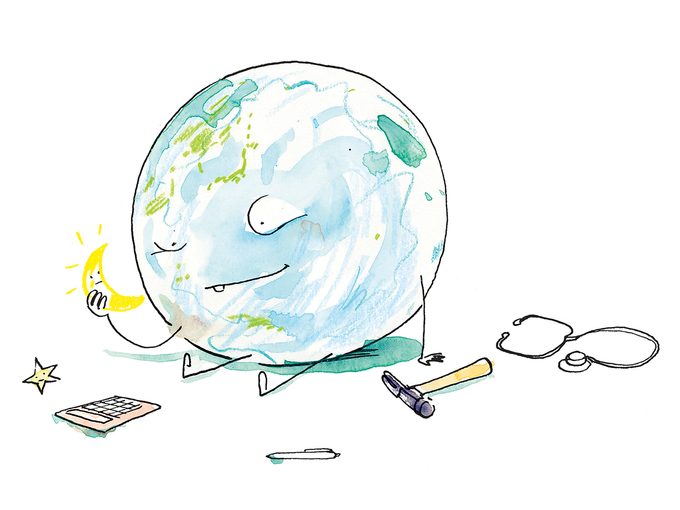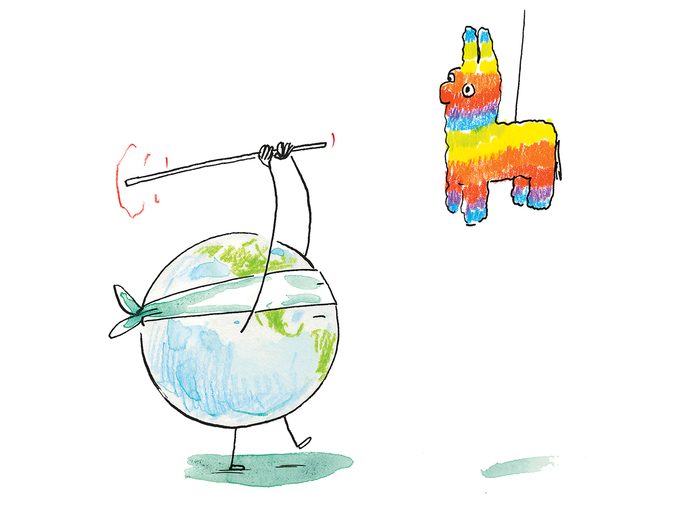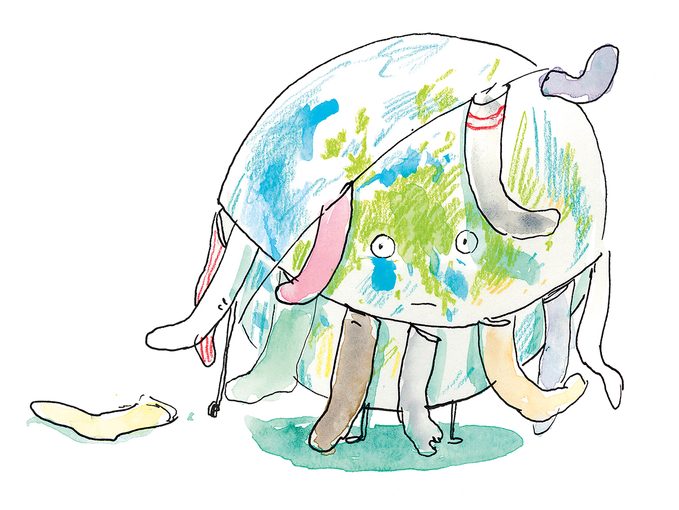Fascinating Birthday Traditions From Around the World
It’s not always about cakes and candles.
A rousing rendition of the Happy Birthday song, the blowing out of candles on a cake and the giving of gifts are common in many places across the globe—from the United States to Spain and from France to Australia. But some countries go above and beyond to celebrate their loved ones in unique ways. Here, the editors of our international editions share some unique birthday traditions.

Birthday Traditions in Australia and New Zealand
Down Under, birthday traditions usually involve firing up your barbecue and having family and friends over for celebratory food and drink.
“A child’s first birthday is often celebrated with what we call ‘fairy bread’—slices of white bread spread with butter and adorned with coloured candy sprinkles—and balloons,” says Reader’s Digest Australia editor Diane Godley.
That fairy bread is replaced with beer and bubbly on a person’s 18th birthday, when they are allowed to drink legally for the first time. Because people used to officially become adults at the age of 21, some families in New Zealand and Australia mark that birthday with a keepsake “key to the door,” representing the child’s privilege to come and go from the family home as they please.
The Chinese Diaspora
Birthday traditions vary quite a bit across the regions and countries with significant Chinese populations. In China’s southern Fujian province and in parts of Taiwan, for example, a person’s 16th birthday marks their passage into adulthood. This belief hearkens back to the Qing Dynasty and the age at which a labourer went from having a half-wage to a full one.
In Singapore, younger people in the Chinese community celebrate their big day according to the Western calendar, and the older generation opts to mark it according to the lunar calendar. There is one thing everyone can agree on, however: a bowl of “longevity noodles.” Sometimes made as a single strand, this is a common birthday food in Chinese communities, says editor Simon Li.
“Noodles are supposed to bring health and a long life, which is why it’s wise to keep them as intact as possible on your birthday,” Li explains. “Care should be taken not to break them while eating with chopsticks.”
There are other taboos to keep in mind. For example, don’t even think about splitting the cake in half. Chinese culture values connection and harmony, says Li, so it’s best to avoid slicing all the way through to the opposite side of the cake when dividing it into pieces for guests. Instead, the dessert is cut one piece at a time.
The Netherlands
The “circle party” is a typical birthday gathering in the Netherlands. The extended family gets together and sits in a circle to talk and eat cake, followed by drinks and a buffet-style dinner. It can be a lengthy process for anyone entering the room at these gatherings, says editor Paul Robert.
“People congratulate not only the person whose birthday it is but also everyone else in attendance by going around the circle and shaking each person’s hand,” he says. “The fastest method is to walk in, wave at the whole circle and shout, ‘Congratulations, all!’ But that’s not considered very polite.”
When someone turns 50, friends or relatives will place a large doll in the birthday person’s garden or by their front door; men have an “Abraham” doll, women a “Sarah.” The dolls refer to a Bible passage from the Book of John in which Jesus is asked how he could have seen Abraham when he’s not yet 50 years old; it also refers to the advanced age at which Sarah, Abraham’s wife, had their child Isaac.

Japan
Celebrating a person’s birthday on the anniversary of the day they were actually born became a tradition only in the last century; in the past, everyone celebrated on the new year. In Japan, regardless of when birthdays took place, there have long been milestone celebrations, ranging from a first birthday to a 60th.
When a child turns one in Japan, they take part in a ritual called erabitori, where the birthday child chooses from a selection of items spread out around them that represent their potential future. If a baby opts for a calculator, they could succeed in business; if they grab a pen, they might become a prolific writer.
On November 15th of the year children turn three, five and seven, their parents dress them in traditional clothing and take them to a shrine. This celebration is shichi-go-san, which literally means 7-5-3—all lucky numbers in Japanese culture. Parents often wish for their children’s continued health and longevity by offering them a long string of soft chitose ame (“thousand-year candy”) in a bag adorned with images of a turtle, a crane and bamboo—all harbingers of good luck.
While a Japanese person officially becomes an adult when they turn 20 (with a coming-of-age celebration held on the second Monday in January), pivotal birthdays don’t end there. A 60th birthday marks the completion of the zodiac cycle (which restarts every 60 years) and is a powerful symbol of rebirth. Known as the kanreki, this festive celebration is hosted by the family; a special cushion, red sleeveless vest and fan may be part of the birthday guest’s attire.
Brazil
In South America’s biggest country, after blowing out the candles and making a wish, the guest of honour slices off a piece of cake and offers it to someone who is important to them—for children, that’s often a parent. But for adults, this time-honoured tradition can rate high on the awkward scale. Says editor Raquel Zampil, “It’s often uncomfortable, since you have to choose one person and disappoint others.”
If the birthday person is single, another funny—or, depending on who you’re asking, uncomfortable—tradition takes place. Before the candles are blown out, the guests will sing a song speculating on the guest of honour’s future marital status. “Who will Maria marry?” they first sing, followed by, “It will depend on whether [name of Maria’s crush] wants to.”
Malaysia
Approximately 60 percent of Malaysians are adherents of Islam, a religion within which birthdays aren’t generally celebrated. However, some Malaysians do mark their birthdays with a family gathering over lunch or dinner the night before the big day and wrap up the celebration by taking stock of their blessings and thanking Allah for giving them life and good health.
The United Kingdom
Birthday parties are very popular in Britain and when children are involved there is almost always a game of “pass the parcel.” The rules: A birthday present that has been wrapped multiple times is passed in a circle from child to child until the music stops. When that happens, whoever is holding the parcel must unwrap a layer and complete whatever “forfeit,” or request, has been written on a piece of paper inside the wrapping.
“Forfeits can range from ‘show off your best dance move’ to ‘do your best impression of the birthday kid,’” says former editor Anna Walker. The child who reaches the final layer of the parcel, which is usually sweets or a toy, gets to keep the gift.
Much older Brits receive their own special present: When they hit 100, the ruling monarch sends along a letter of congratulations.

Mexico
An emblematic Mexican birthday-party tradition—one that has spread across the globe—is the smashing of a piñata. Blindfolded, stick-wielding celebrants whack a brightly coloured container hanging from a string until it bursts open, raining down candy. Though now often made from papier mâché and in a range of forms that includes animals and celebrities, piñatas are traditionally composed of clay and spherical in shape (with protruding spikes).
In lieu of “Happy Birthday,” Mexicans belt out “Las Mañanitas” (“Little Mornings”), a song believed to have originated in Spain in the 16th or 17th century. “It is sometimes sung in the morning to wake up the person whose birthday it is,” says Carlos Díaz, who is the editor of the Mexican edition of Reader’s Digest, “but mostly we sing it around the cake before the candles are blown out.”
Lithuania
“In my native country, it is customary for the person whose birthday it is to sit in a decorated chair that is then lifted up by the party guests,” says editor Eva Mackevic. “How many times the chair is raised will correspond with the age of the guest of honour.”
Another frequently observed tradition: The person whose birthday it is will be responsible for paying for their guests, whether that means footing the bill for drinks, dinner or a big party.
Finland
“When a Finn turns 18, they can get their driver’s license and go to restaurants unaccompanied,” says editor Ilkka Virtanen. It is therefore common for 18-year-olds to mark their entry into adulthood by heading to a restaurant with friends or having a big, boozy party at home. This is the one birthday where attendees are expected to pay their own way; on other birthdays, the guest of honour takes on the cost.
Fifty is another big milestone in Finland, with the birthday person typically hosting a reception featuring coffee, cake and sparkling wine, and guests offering the celebrant gift cards for a spa, a restaurant or, for the more intrepid, a parachute jump.
Philippines
For Filipinos, a birthday isn’t just a celebration of the day—it’s an occasion to spend time with family. Traditionally, anyone living within a day’s travel must be invited, or involved in the planning, and each guest is assigned a dish to bring. Central to the celebration are “longevity noodles” (symbolizing a long, healthy life), a cake ideally made from taro or purple yam, and karaoke.
Pivotal birthdays in the Philippines include ages one, seven, 18 and 21. A child’s seventh birthday marks the year the child can be held more accountable for their actions, while a person’s coming of age is celebrated on their 18th (for women) or 21st (for men).
India
For many Indians, the majority of whom are Hindu, birthday traditions involve religious rituals. The day usually starts with a visit to the temple, where prayers are offered and blessings are received. The person celebrating also seeks the blessings of their family’s elders by bowing down and touching their feet.
“Some people also perform charitable acts or make donations to help those less fortunate than themselves,” says editor Ishani Nandi.
A birthday is also an occasion to wear new clothes and to enjoy one’s favourite dishes, prepared by family members. In return, the guest of honour gives the first piece of their cake to the oldest person in their family.
Schoolchildren, for their part, will often distribute sweets or candies to their classmates.

Germany
According to editor Michael Kallinger, one of the country’s most notable birthday traditions involves sweeping stairs. “In Bremen, when unmarried men turn 30, it is customary for them to sweep the stairs of the local church or town hall,” he says. “Women have to clean the door handle.” This public act of sanitation is meant to embarrass the person and motivate them to marry.
In other northern regions, if a man is still single on his 25th birthday, his front door gets decorated with a garland made of socks, labelling him as an “old sock.” An unmarried woman turning 25 gets a garland of boxes, because she is now considered an “old box” (like “old sock,” it’s an ironic term for the elderly).
Germans who actually are elderly receive a message from the country’s president on their 100th birthday.
Wacky Birthday Traditions in Canada
Depending on how vindictive a Canadian’s family and friends are, the “birthday bumps” can be a dreaded ritual or a gentle joke. Here’s how the tradition works: The guest of honour lies on their back, and partygoers grab them by the arms and legs. The guests lift and then lower the birthday person to the ground until their bum lightly “bumps” against it.
Alternatively, a guest grabs the birthday person by the shoulders and “bumps” them on the backside with one knee, up to the number corresponding with the person’s age…plus an extra bump for good luck. (There is a reason this tradition is usually carried out on children—40 bumps would be exhausting for all concerned.)
There are regional particularities when it comes to birthday traditions, as well. In parts of the country’s east coast, kids get surprised by someone dabbing butter or grease on their nose, a tradition reputed to help them “slip away” from bad luck.
And in French-speaking Quebec, says editor Hervé Juste, guests sing the chorus from “Gens du Pays” (which translates as “people of the country”), a song that legendary folk singer and poet Gilles Vigneault created as an alternative to “Happy Birthday.” It was also adopted by Quebec’s sovereignty movement and has become the province’s unofficial anthem.
Next, check out 75 birthday jokes that’ll leave ’em howling.






